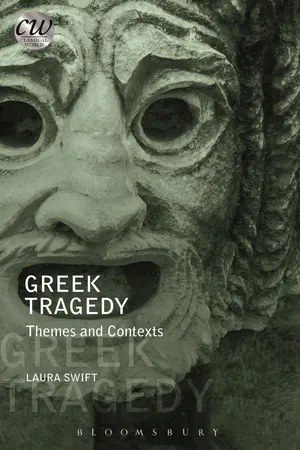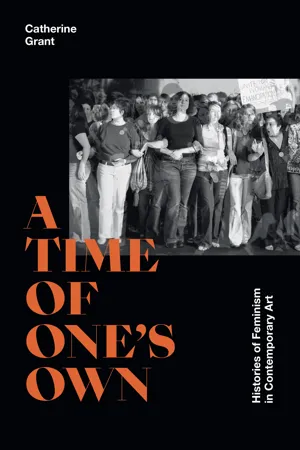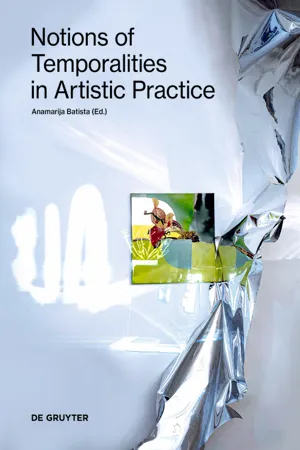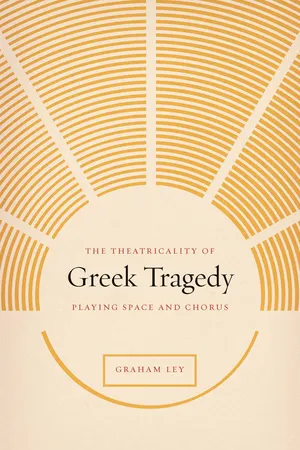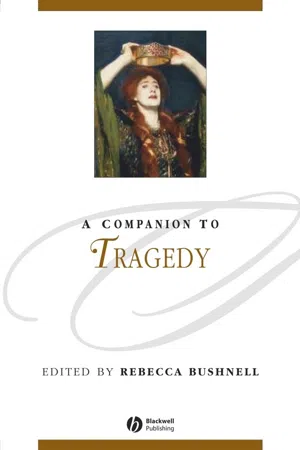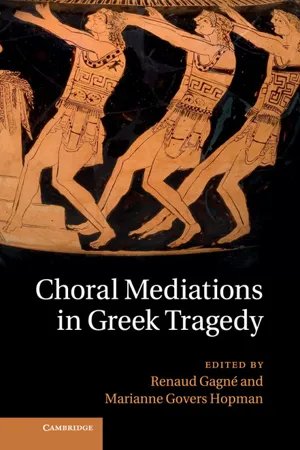Literature
Chorus
In literature, a chorus refers to a group of characters who serve as a collective voice, often providing commentary or insight into the events of the story. Originating from ancient Greek drama, the chorus typically offers reflections on the themes and actions of the play, serving as a bridge between the audience and the characters.
Written by Perlego with AI-assistance
Related key terms
1 of 5
7 Key excerpts on "Chorus"
- eBook - PDF
Greek Tragedy
Themes and Contexts
- Laura Swift(Author)
- 2016(Publication Date)
- Bloomsbury Academic(Publisher)
Choral authority and choral identity As we have seen, the Chorus is quick to offer opinions, and scholars have long debated how much the audience is likely to be influenced by these comments. The nineteenth-century classicist August Schlegel described the Chorus as the ‘ideal spectator’, meaning that it represents how an average audience member would react. Modern scholars have questioned this close identification between Chorus and audience. For a start, we cannot assume such a thing as a ‘typical’ audience member: the audience of Greek tragedy was diverse, and as with any piece of complex art, people will differ in their responses to it. That said, the Chorus usually consists of a group different to the majority of the audience (Athenian males), and it may be unsafe to assume that they would automatically align themselves to a group of women, slaves or Greek Tragedy 104 foreigners. Moreover, tragedy is full of Choruses with partisan views that the audience is unlikely to share. If we followed the Chorus of the Bacchae in thinking that Pentheus was a wicked man who deserved everything he got, the play would be a dull morality tale. The Chorus does not always have as complete a picture as the audience, and many plays create irony by juxtaposing their limited understanding with the audience’s greater awareness. For example, in Sophocles’ Oedipus the King , the Chorus are ignorant of Oedipus’ identity and cling to the belief that he can save the city, when he is the cause of the plague. But Schlegel’s idea has a truth at its core, namely that the Chorus has a significant effect on how the audience responds, and their relationship with the audience is different to that of the characters. The fact that the Chorus is always present and can assess everything that happens casts it in the role of an internal audience. Most Choruses are not directly involved in the events of the play, and so like the audience are onlookers (though not necessarily impartial ones). - eBook - PDF
A Time of One's Own
Histories of Feminism in Contemporary Art
- Catherine Grant(Author)
- 2022(Publication Date)
- Duke University Press Books(Publisher)
Be- fore turning to this aspect of the Chorus, I explore how the Chorus historically has been used for learning and community making. The Chorus A Chorus indicates a group speaking, singing, standing together. A Chorus is also the song being sung or spoken by the group.19 In its original Greek context, the Chorus indicated dancing as much as singing, as H. P. Kitto has described: “The Greek verb choreuo, ‘I am a member of the Chorus,’ has the sense ‘I am dancing.’ ” He continues: “The ‘orchestra’ in which the Chorus had its being is, literally, a dancing-floor.”20 This dancing was a way to embody elements of the poetry they were performing, with scholars arguing for a broader definition of dancing than we would understand today, so that dancing indicates the use of gesture, pose, and attitude.21 What these gestures and movements might have been has been lost, but the function of the Chorus has continued in drama to the present day. In my version of a feminist Chorus, this etymology pays at- tention to the Chorus as bodies gathered together so that the Chorus is both a physical and a sonic taking up of space, a gathering together of bodies and voices.22 These bodies are not necessarily choreographed; instead, the experi- ence of being one body among many is activated through the speaking or sing- ing that takes place communally. A Feminist Chorus 95 The Greek Chorus was central to religious festivals and dramas, with Chorus members drawn from the general population of Athens. Peter Arnott argues that the Chorus onstage both reflected and was an extension of the audience watching. Rather than a passive audience, an Athenian audience would have been in active partnership with the performers onstage, and many of the au- dience members would have taken part in Choruses themselves. - Anamarija Batista(Author)
- 2022(Publication Date)
- De Gruyter(Publisher)
Where earlier versions of the lyric Chorus aimed at supporting the leading singer, the tragic Chorus started to form a distinct character that assumes a specific dramatic role. From this moment until the 4th century BC, the tragic Chorus either acts as the representative of the public in general or refers to certain parts of society. It is linked to a collective that exists in the life-world (Fisch- er-Lichte, 2005, p. 49). Thus, every Chorus has a character that more generally refers to so- ciety, or more specifically to a defined group like young women or old men (Nübling, 1998, pp. 86–87). While there is disagreement on whether the Chorus in the plays of Aeschylus, Sophocles or Euripides speaks with an authoritative voice (Dhuga 2011) or on the contrary, expresses marginalized views (Gould 1996), there is a shared conviction that it constitutes a supra-individual entity. To underline its non-individual, unnatural character, members of the Chorus are sometimes masked: The visible diversity of the players is erased. Accord- ingly, the Chorus develops as a distinct character that clearly differs from other characters, formally as well as in terms of dramatic function. While the Chorus’s significance slowly decreased after the heyday of Ancient Greek tragedy, it has a revival in the 20th century performing arts. Initially, this revival is linked to a growing interest in the political impact as well as the pedagogical potential of the theatre. Bertolt Brecht’s Epic Theatre introduces the Chorus as a dramatic tool to alienate the audience (cf. Baur, 1998) with the ultimate aim of initiating a social transforma- tion. The search for an anti-illusionistic theatre recognizes the potential of the Chorus in introducing an artificial character. Moreover, the concept of the Chorus is attractive to those who are skeptic of the sovereignty3 of the individual.- eBook - PDF
The Theatricality of Greek Tragedy
Playing Space and Chorus
- Graham Ley(Author)
- 2010(Publication Date)
- University of Chicago Press(Publisher)
chapter two The Chorus The problem of the Chorus ( choros, choroi ) is central to our contemporary understanding of Greek tragedies, and it is deeply frustrating. On the one hand, we sense that here is something vital, perhaps almost mystical, oper-ating powerfully and evocatively throughout the action and theatricality of the plays. On the other hand, our initial fascination and excitement can gradually dissolve into resignation. The prefatory comments of Golder, one of the editors of an important collection of essays, although perhaps unduly pessimistic about the achievements of modern production, acknowledge this feeling: “The non-specialist who knows nothing else about Greek drama knows it had a ‘Chorus.’ But as almost anyone who has ever seen a Greek play can attest, the Chorus is every director’s nightmare. It almost never ‘works.’ More often than not, its spectral presence proves the impossible otherness of the Greeks.” 1 Similarly, everyone who has trained for the theater will have ex-perienced the choral workshop, in one form or another, which is usually based on movement and seen as an almost philosophical starting point for generic exercises in group movement, voice work, and the anonymous ensemble. Workshops of this kind may provide an exhilarating experience. But few participants would feel confident that they have come close to anything au-thentic, and many would feel that their actual understanding has made very little progress toward Golder’s “impossible otherness” of the Greek Chorus. A good starting point in tackling this awkward problem might be with the concept of choreography, which in the context of the Athenian theater in-volves both music and dancing, and problems associated with these topics will occupy much of the central part of this chapter. The institutional and ideo-1. Golder and Scully 1995, 1. - eBook - ePub
Democratic Swarms
Ancient Comedy and the Politics of the People
- Page duBois(Author)
- 2022(Publication Date)
- University of Chicago Press(Publisher)
5 The Chorus precedes drama as we have received it.Choruses in drama have a special status, and although there is a wide variety of Choruses, of membership, and their role in the dramas, they are often subordinated in analysis to the actions and speech of the characters who stand alone and pronounce their speeches, speak to other characters, or engage in exchanges with the members of the Chorus. One of the pressing issues I want to illuminate here is that the Chorus, which embodies lines of flight, of escape from the confinement of text in performance, can gesture toward a more pluralistic conception of the polis, the inhabited city and its territory, many varieties of spaces, and the demos, which included the citizens, as well as many varieties of others—slaves, foreigners, Greek and not, and women.6 - eBook - PDF
- Rebecca Bushnell(Author)
- 2008(Publication Date)
- Wiley-Blackwell(Publisher)
In fact, by transposing a Euripides-like tragedy into medieval, Christian Sicily, Schiller intended his Braut von Messina ( Bride from Messina , 1803) to be a ‘‘tragedy with Choruses.’’ In his preface, the romantic playwright conflates his representation of the tragic Greek Chorus with his self-imposed rule for his own dramatic work. 1 In this normative view, based on the supposed role of the choral group in Greek tragedy, the Chorus corresponds to ‘‘a general concept,’’ empiri-cally represented by ‘‘a powerful, feeling crowd.’’ The function of the tragic Chorus, both as a real and ideal entity, would thus be to accompany, and comment on, the dramatic action. It would draw lessons of universal importance from the staged drama. Levels of Enunciation Leaving aside these German romantic attempts to define the Greek tragic choral group, and to assign it functions ranging from the reality of an idealized audience to the philosophical ideal of an aesthetic poetics, let us turn to historical conceptions and categories. In the descriptive, genetic, and normative perspective that informs his Poetics , Aristotle famously singled out singing ( me´los ) as one of Attic tragedy’s constitutive parts. The Chorus is thus a part of the whole and, as such, is called upon to contribute to the action ( sunag onı´zesthai ). 2 With its focus on the mu ˆthos as plot and driving force, however, Aristotle’s thesis is primarily concerned with the narrative and moral dimension of tragedy. Conversely, in the famous debate between Aeschylus and Euripides portrayed by Aristophanes in Frogs , the technical term used for tragic staging is dida ´skein . In the context of the discussion on citizenship, this description in fact summarizes the function of the dramatic poet as he is defined by his contemporaries, as a (khoro)dida ´skalos . Indeed, it appears that the first tragedians, themselves dancers, were responsible for the choreography of the choral group. - eBook - PDF
- Renaud Gagné, Marianne Govers Hopman(Authors)
- 2013(Publication Date)
- Cambridge University Press(Publisher)
3 I first analyze the Chorus as a narrator of the war against Greece and show that it offers a perspective unlike the actors’ in its wide range of objects, viewpoints, and ideologies. That breadth of per- spective, I further argue, is fostered by a plot that progressively constructs the Chorus as Xerxes’ antagonist and thus partly aligns its interests with those of the Athenian audience. Consequently, I suggest that the final reconciliation between king and Chorus may have spread to the audience and encouraged the spectators to emotionally, if not effectively, join in the Persian lament. Besides shedding light on the much-debated prag- matics of Persians’ 472 bce production, I hope to make two larger points about dramatic Choruses: that the narratological concept of perspective can help us grasp the complex referentiality of some Choruses, and that our understanding of tragic Choruses can gain from a comparison with comic Choruses.
Index pages curate the most relevant extracts from our library of academic textbooks. They’ve been created using an in-house natural language model (NLM), each adding context and meaning to key research topics.
